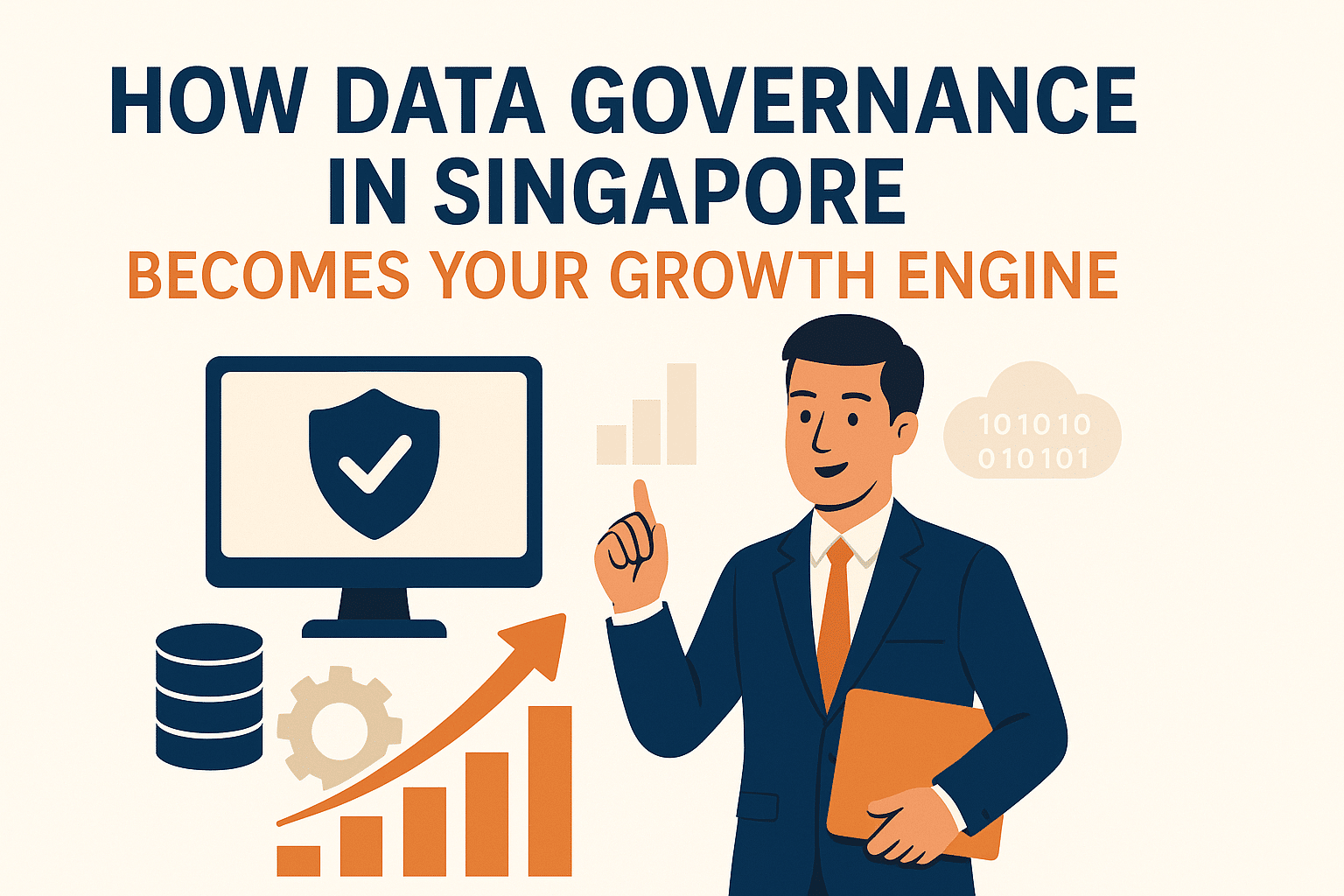
Why Data Governance in Singapore Drives Growth
How Data Governance in Singapore Becomes Your Growth Engine
Most businesses in Singapore collect more data than they can handle, and they’re paying for it in missed opportunities, costly inefficiencies, and growing risk.
When data governance enters the conversation, many leaders mentally file it under compliance rather than growth. That mindset creates a silent drag on performance. What if data governance in Singapore wasn’t a box-ticking exercise, but a tool for speed, trust, and more intelligent decisions?
Key Takeaways of this Article
- Strong data governance is a growth lever, not just a compliance task.
- Poorly governed data hinders decision-making and erodes customer trust.
- Good governance enables faster launches, better insights, and sustainable scaling.
- Business leaders must drive governance, not delegate it.
What Is: The Quiet Cost of Disorganised Data
Disparate systems. Conflicting reports. Teams are working off different versions of the truth. Sound familiar?
These are symptoms of weak governance. They quietly erode performance every day.
A marketing team launches a campaign based on outdated customer segments. Finance models diverge from operations dashboards. Data scientists spend most of their time cleaning data instead of analysing it.
When governance is absent or unclear, data becomes a liability. You lose trust. You lose speed. You lose your edge.
The cost isn’t just internal. Partners and regulators may start to question your organisation’s credibility. When that happens, you lose external confidence, and opportunities begin to disappear.
What Could Be: Governance as a Competitive Advantage
Now imagine a different reality:
- Every department has access to clean, reliable data.
- Ownership and roles are clearly defined.
- New products launch without weeks of data wrangling.
- Compliance is built in, not added later.
That’s what good governance delivers. It turns data into a competitive edge.
Take DBS Bank. They restructured their governance to ensure traceability, data quality, and cross-department alignment. The result? Faster product innovation and stronger trust with both regulators and customers.
Unilever did the same on a global scale. Their data governance programme enabled consistent reporting across markets. Local teams could move quickly because their data was reliable and easily accessible.
These aren’t outliers. They’re examples of what happens when governance works.
Why Data Governance in Singapore Is No Longer Optional
In Singapore, data governance is no longer just a “good practice.” It’s required.
The Personal Data Protection Act (PDPA) enforces strict rules on how organisations manage personal data. Across the region, cross-border transfer restrictions and localisation laws are also tightening.
As AI adoption increases, the volume and sensitivity of data will only grow. If your governance is weak, the risks multiply.
Insufficient data affects AI accuracy. Poor access controls create compliance gaps. Customers now expect complete transparency, such as knowing where their data goes, who uses it, and for what purpose.
If you fail that expectation, you won’t just face fines. You’ll lose trust.
The Business Benefits of Getting Governance Right
Here’s what strong data governance delivers:
- Speed: No more delays chasing owners or verifying reports.
- Clarity: Everyone makes decisions from the same source.
- Trust: Customers, regulators, and partners know you’re in control.
- Scalability: Growth won’t break your systems or processes.
- Compliance: Audits become straightforward.
- Efficiency: Less manual clean-up. More time for insights.
Good governance cuts waste. It reduces risk. And it empowers your teams to move faster with confidence.
How to Start: A Leader’s Role in Governance
This isn’t just an IT project. It needs to be led by business.
Here’s how leaders can start:
1. Define Data Ownership
Clarify who owns each dataset. Assign approvers and set rules.
2. Align Policies with Practice
Keep governance practical. Make policies usable, not theoretical.
3. Choose the Right Tools
Use catalogues, access controls, and metadata systems that support good habits.
4. Build a Culture of Responsibility
Everyone who touches data should understand their role. This isn’t optional.
5. Set Regular Reviews
Governance must evolve. Check what’s working and update where needed.
6. Train Your Teams
Make data literacy and governance part of the onboarding process. Refresh often.
Start small. Select one high-impact area, such as customer data or finance, and build upon it.
Your Next Step
Ignore governance, and your business will move more slowly, break more often, and face growing risk.
Treat it like a strategic function, and you’ll gain speed, insight, and trust. That’s the difference between companies that grow with confidence and those that stall under their own data.
Want to audit your governance maturity? Hybrid Analytica can help. We’ll identify gaps, quick wins, and build a roadmap that fits your business, not someone else’s framework.
FAQ: Data Governance for Business Leaders
- Is data governance only relevant to large enterprises?
No. Even SMEs handle sensitive data. Good governance prevents errors and protects growth. - How long does it take to implement data governance?
It depends on your size. But you can see results quickly by focusing on one area at a time. - Isn’t it IT’s responsibility?
IT helps. But business units must lead. They use the data to make decisions. - What frameworks should we use?
Start with simple principles: ownership, access rules, and data quality. Layer on DAMA-DMBOK or ISO standards later. - What if we already have governance policies?
That’s great. But are they used? Many companies have policies that aren’t followed. Embed them into daily routines. - What does a governance roadmap look like?
It includes data domains, policy rollout plans, ownership roles, and regular review cycles. - Can governance improve our AI strategy?
Yes. AI needs high-quality data. Governance ensures that the input is trustworthy, which in turn makes the output better. - Is there a quick way to assess our current governance?
Yes. Hybrid Analytica offers assessments to measure your maturity, identify risks, and provide recommendations for improvement.
Ready to lead with data, not get buried by it? Reach out to Hybrid Analytica today at enquiries@hybridanalytica.com.sg





